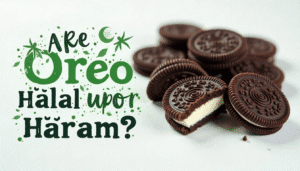Oreo biscuits are known everywhere as popular and widely enjoyed snacks. Whether people enjoy them with milk or need a small treat, the classic cookies with vanilla cream have garnered a loyal following. Nonetheless, for those following a halal diet, this question is fundamental:
Are Oreo biscuits halal or haram in Islam?
Although Oreo biscuits do not initially seem hazardous, not all sources have confirmed that they are halal. A lot depends on the manufacturing location, the flavor chosen, and the raw materials used at that location. In this article, we provide a detailed explanation to help Muslim consumers understand this popular snack.
The Global Popularity of Oreos
Mondelez International is the company behind Oreo biscuits. Because production occurs in North America, Europe, Asia, and the Middle East, Oreo is available in over 100 countries. Because products are manufactured worldwide, their ingredients and formulas may vary across different countries.
Even though recipes appear unchanged, different laws, local sourcing, and consumer preferences can cause Oreos to vary, especially in halal matters.
Are Oreo Haram? Here’s the Real Answer
The answer is not a simple yes or no. Oreo biscuits are halal in some countries, but not in others. This is because of two main reasons:
-
Lack of official halal certification in many countries.
-
Use questionable ingredients, particularly flavourings and vitamin additives that may be derived from haram sources.
Ingredient Analysis: What’s Inside an Oreo?
Let’s take a closer look at the standard ingredients in a classic Oreo (U.S. and U.K. versions):
-
Unbleached enriched flour (wheat flour, niacin, reduced iron, thiamine)
-
Sugar
-
Palm and/or canola oil
-
Cocoa (processed with alkali)
-
Leavening (baking soda and/or calcium phosphate)
-
Salt
-
Soy lecithin
-
Chocolate flavor
-
Natural and artificial flavors
At first glance, most of these ingredients appear to be halal. However, the biggest concern lies in the “natural and artificial flavors,” which are often vague and undisclosed. In many processed foods, such flavors are dissolved in alcohol or extracted from animal-based enzymes, which may be haram if derived from non-halal sources.
Another concern is the potential use of cross-contaminated machinery or production facilities that handle non-halal ingredients.
Official Manufacturer Statements
In countries like the United States, Canada, and the United Kingdom, the manufacturer Mondelez has confirmed:
“Oreo biscuits are not halal-certified. Some varieties may contain alcohol-based flavorings.”
Many Muslims choose not to eat Oreos because, although no direct animal products are said to be present, the ingredients used in their manufacturing process may affect their production, and these products have not received halal certificates.
Halal-Certified Oreos Exist — But Not Everywhere
Good news: Oreo biscuits are manufactured locally and are halal-certified in many Muslim-majority countries. Oreo products are tailored to meet Islamic dietary laws in these regions and labeled accordingly.
Here are some examples:
-
Malaysia: Oreos are certified halal by JAKIM (Department of Islamic Development Malaysia).
-
Indonesia: Halal certified by LPPOM MUI, the leading halal authority in Indonesia.
-
United Arab Emirates (UAE) and Saudi Arabia: ESMA or GSO authorities often certify products.
-
India: Some Oreo lines are certified halal, depending on the manufacturing plant.
When shopping for Oreos in these countries, you can usually find a clear halal logo on the packaging, which gives Muslim consumers peace of mind.
Oreo Flavors That May Not Be Halal
Most Oreo cookies are traditional, but flavored and rare varieties cause additional worries. Some of the different ingredients you’ll find in such tacos are:
-
Coffee or mocha extracts (which may consist of caffeine or alcohol-based solvents)
-
Birthday cake flavorings (which may use artificial flavors dissolved in ethanol)
-
Fudge coating (which could contain non-halal emulsifiers or dairy derivatives)
It is strongly recommended that Muslims avoid flavored Oreos unless they are halal-certified in their country.
Final Verdict: Can Muslims Eat Oreos?
The answer is: it depends on your location and the product certification.
| Country | Halal Status of Oreo | Notes |
|---|---|---|
| USA | Not halal-certified | Contains questionable flavoring |
| UK | Not halal-certified | Alcohol-based flavoring used |
| Canada | Not halal-certified | No halal label, vague ingredients |
| Malaysia | Halal-certified | Labeled by JAKIM |
| Indonesia | Halal-certified | Certified by MUI |
| UAE / KSA | Halal-certified | Halal production standards followed |
| India | Some lines are certified | Check packaging |
If you live in a country where Oreo is halal-certified, you can enjoy it with confidence.
If not, it’s safer to avoid it due to the risks of haram flavorings and lack of certification.
Conclusion
Although Oreos seem like a standard cookie, Muslims observing halal choose to ensure the ingredients are certified. In some places, you can get Oreos that have been made to meet Islamic guidelines, but in other areas, the same assurance is missing.
Be sure to read that the product is certified as halal, and if you aren’t sure about the flavorings, ask the company about their sources. A halal lifestyle is much easier when you can make good food decisions.



